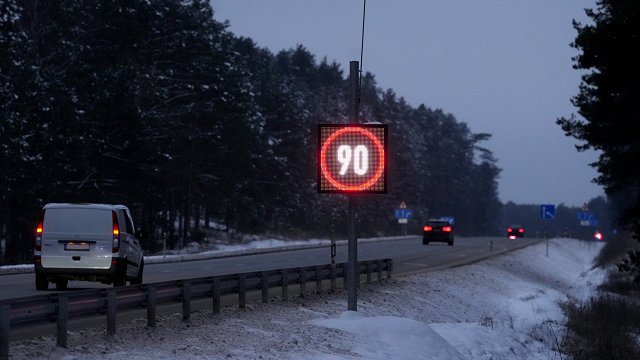The money is expected to be redistributed to projects including the troubled "Rail Baltica" project and the reconstruction of the Rīga Central Station, which has remained unfinished for the time being. However, deep disagreements have arisen among coalition politicians, according to De Facto.
Decisions must be made in September and the delay of one ministry can affect the redistribution of all the rest of the money.
Which of the Rail Baltica railway project's plans must be built by 2030 as the first phase of completion? This decision has been discussed for almost a year, but it still hasn't happened. The next deadline is set for the end of September, when the proposals must be on the government's table.
A working group created this summer is now looking at the options. There aren't many realistic scenarios anymore. For example, one of them is to connect the basic track of "Rail Baltica" with Rīga stations, with passengers transferring to trains on existing railway lines – hardly the brave new world of high-speed travel originally envisioned.
"Currently, however, we see that it is necessary to look at it [Rail Baltica] in an integrated manner together with the already existing railway system. So that they complement each other and so that we can make maximum use of the investments both in the new railway line and in the existing ones that we have in Latvia. So we are currently working with the aim of looking at it together, integrated as one railway system, and offering the best possible solution," says Kristīne Malnača, State Secretary of the Ministry of Transport for Rail Baltica.
The latest decision of the European Commission (EC) is a clear confirmation that, at least in the first stage, Rīga will not have money from European funds for all of its original infrastructure plans for the Latvian capital. Funding for connections to the airport, the Central Station, and the bridge over the Daugava in Riga, where the first supports were already hastily installed this spring, were rejected.
Less than was asked for was allocated to both construction supervision and project management, which also includes wages for the employees of "RB Rail" and "European Railways" (EDzL). Now the Transport Ministry is asking for additional funding from the state budget – 34 million over four years – both for land expropriation and construction supervision, as well as project management.
RB Rail [the joint venture responsible for the Rail Baltica project] board member Kitija Gruškeviča avoided a direct answer to the question of whether, asking for money from the government, RB Rail staff would be prepared to cut their own salaries as a cost-cutting measure.
"At the moment, RB Rail has attracted a lot of foreign experts with the kind of competence that absolutely no one has in Latvia, Lithuania or Estonia," she pointed out.
When asked if her own competences are worth 20,000 euros per month, she says: "It's very difficult to say there in specific numbers, because it depends on the function and it depends on the duties of that particular expert."
In the list budget priorities, the Transport Ministry announced the need for another 10 million euros for the purchase of land, and for ensuring the operation of 'EDzL'. The Ministry even announced this week that it will call for the government to ask the European Commission to explain in detail its refusal to finance some aspects of Rail Baltica.
But it is still the case that for every 85 euros given to Latvia by the EC, 15 of its own must be found as co-fnancing in return. Currently, the Transprt Ministry is looking for 131 million euros to complete the southern part of the Central Station. It hopes that for the needs of "Rail Baltica" it will be possible to transfer the money previously received from European funds and the Recovery Fund. At the moment, around 400 million euros are frozen.
However, there are also delays in preparing documents so that the money can be redistributed. For example, the railway infrastructure development plan for 2023-2027 has not yet been approved – despite the fact that we are now well into the second half of 2024. Without this plan, Europe will not make payments.
Last week, at the government meeting, it was urged that the paperwork be submitted by the beginning of September, with Transport Minister Kaspars Briškens (Progressives) and Prime Minister Evika Siliņa (New Unity) in essence blaming each other or not making the necessary decisions to move forward.
Meanwhile the third party in the ruling coalition, the Greens and Farmers Union (ZZS) is attempting to distance itself from a share of the blame by issuing a statement that it will provide political support for the further implementation of Rail Baltica when there are clear answers on how to finance it.
"In my opinion, it would be wrong to simply continue moving forward in this way. This position, I really hope, will shake up the relevant ministry a bit and force them to come up with clearer visions of the overall picture, in which way this project could be moved forward," said Economy Minister Viktors Valainis (ZZS).
At the beginning of September, changes to the "Rail Baltica" law should also be on the government's table. It would finally define exactly what decisions are negotiable at what level.
An audit of the management of the Rīga Central Station and Airport Station construction contracts signed off by European Railway Lines, as well as an assessment of how RB Rail managed the design contracts, is soon planned as part of the Transport Ministry's efforts.
Whatever the conclusion, it is unlikely to increase the chances that Rail Baltica will be ready by 2030, which remains the target date or completion of the first phase of the project.

































